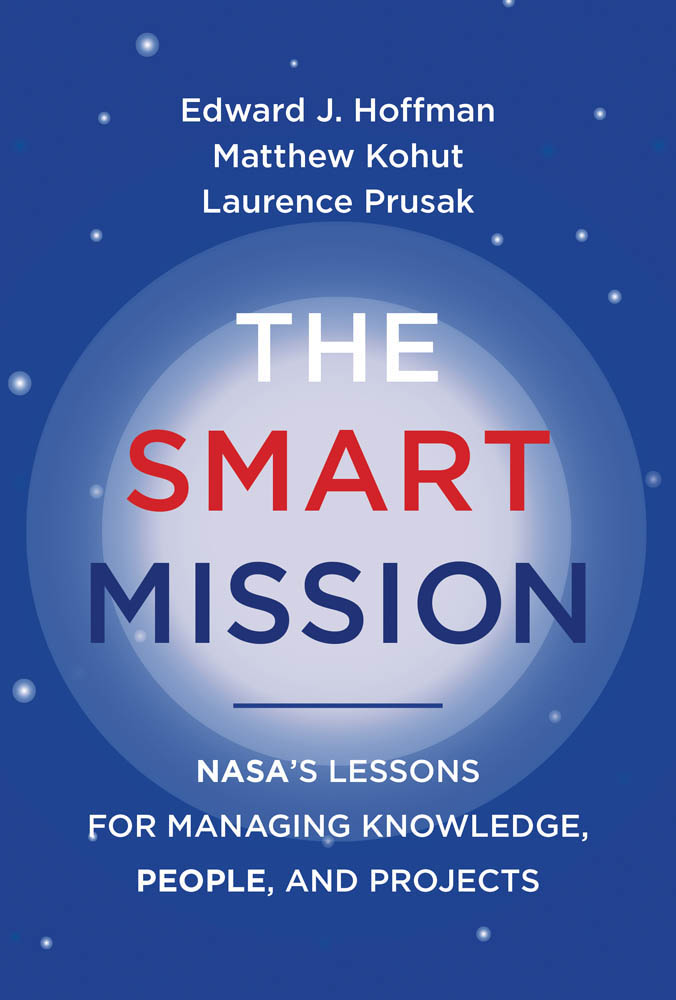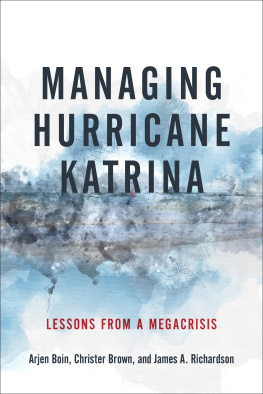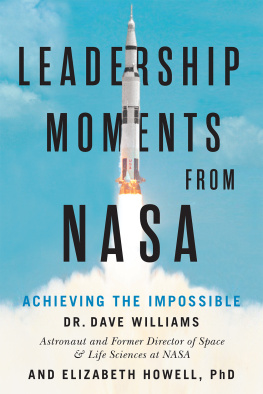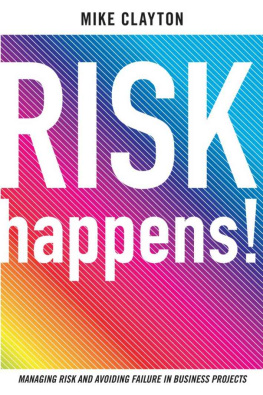
The Smart Mission
NASAs Lessons for Managing Knowledge, People, and Projects
Edward J. Hoffman, Matthew Kohut, and Laurence Prusak
The MIT Press
Cambridge, Massachusetts|London, England
2022 Massachusetts Institute of Technology
All rights reserved. No part of this book may be reproduced in any form by any electronic or mechanical means (including photocopying, recording, or information storage and retrieval) without permission in writing from the publisher.
The MIT Press would like to thank the anonymous peer reviewers who provided comments on drafts of this book. The generous work of academic experts is essential for establishing the authority and quality of our publications. We acknowledge with gratitude the contributions of these otherwise uncredited readers.
Library of Congress Cataloging-in-Publication Data
Names: Hoffman, Edward J. (Edward Jay), 1959- author. | Kohut, Matthew, author. | Prusak, Laurence, author.
Title: The smart mission : NASAs lessons for managing knowledge, people, and projects / Edward J. Hoffman, Matthew Kohut, and Laurence Prusak.
Description: Cambridge, Massachusetts : The MIT Press, [2022] | Includes bibliographical references and index.
Identifiers: LCCN 2021046198 | ISBN 9780262046886 (hardcover)
Subjects: LCSH: United States. National Aeronautics and Space Administration. | Organizational learning. | Knowledge management.
Classification: LCC HD58.82 .H627 2022 | DDC 658.4/038--dc23/eng/20211221
LC record available at https://lccn.loc.gov/2021046198
d_r0
Contents
- Don Cohen
Introduction
The project is the basic unit of work for many of the largest and most complex organizations in the world. Whether the end result is a software application, antiviral vaccine, or spacecraft, a great deal of work today gets done at the project level. In a very real sense, we live in a project world. From blockbuster films to energy production, the project is the unit of organization for a significant share of global economic activity.
And yet projects are failing us because they are understood and defined in the wrong way. A project of any complexity is an effort to harness multidisciplinary expertise to solve challenges for the benefit of people. But the dominant paradigm of project management is one of control, processes, and tools. This disregards the human dimensionlearning, collaboration, teaming, communication, and culturethat is intangible, hard to measure, and resistant to control.
Projects run on knowledgea combination of learning and experience that enables people to perform tasks. A project can have all the resources in the world, but without the necessary knowledge it is doomed. There are plenty of other reasons that projects fail, but lack of know-how almost guarantees a bad outcome. This kind of knowledge is not a thing that can be found in a book or hoarded by an individual. It comes from experienced people working in a team setting.
Some organizations understand the interplay of knowledge, projects, and people better than others. This book will explore some of the intangible elements that inform projects and share insights about approaches and practices that successful organizations have adopted to address them so that others can consider new approaches to working and learning in a project environment.
Three leitmotifs recur throughout this book. The first is that projects are fundamentally about how teams work and learn together to get things done. Project teams are not like professional sports teams that play games with clearly defined rules. Project teams may rely on repeatable processes to design, build, test, and deliver products or services, but innovation, whether incremental or radical, depends on team learning. As Arie de Geus of Royal Dutch Shell Group writes, The ability to learn faster than your competitors may be the only sustainable competitive advantage.
Second, the local level is where the action happens. Innovations and breakthroughs that lead to project success rarely come from the top of large, centralized organizations. If anything, a burdensome bureaucracy will spur a project team to expend considerable time and energy finding ways to work around it. This is nothing newthe agile movement that began two decades ago has brought widespread recognition to the benefits of decentralized decision-makingbut the implications for knowledge often go unnoticed. The governance of knowledge and projects in large organizations is typically most effective when it empowers people working at the local level to respond quickly to changing conditions.
Finally, projects dont operate in a vacuum. They exist within organizations that are responsible to stakeholders, whether they are corporations accountable to shareholders or government agencies accountable to political leaders and the public. A projects success or failure depends in large part on the health of this ecosystem.
Projects can vary so dramatically in complexity that its useful to have models that help explain the dimensions of their knowledge needs. The traditional project management iron triangle of cost, schedule, and scope does little to articulate the differences between a project that delivers a sidewalk versus another that delivers a supercollider, let alone accounting for elements like knowledge, learning, communication, team dynamics, culture, or collaboration. We address these elements first by considering the environment at the organization, team, and individual levels.
There is a symbiotic relationship between an organization that pursues its mission through projects and the teams and individual members that execute them. The organization supports its teams and individuals by providing resources and infrastructure for knowledge and learning as well as a culture that shapes the work environment. This enables teams and individuals to learn and acquire the knowledge needed for their projects, which in turn increases the organizations capability for future projects.
We approach project complexity through the lens of knowledge and learning needs, identifying three project modelsmicro, macro, and globalthat each operate on different knowledge chess boards.
A micro project seeks to solve a problem that is finite and primarily technical in nature. The challenge can be simple or difficult, but the solution comes as a result of having the right technical know-how to get the job done. The classical Greeks called this kind of knowledge episteme, or scientific knowledge based on repeatable rules. A micro project can be a straightforward software project such as delivering a feature for a website, or it can require a great deal of innovation (think of an ambitious R&D initiative), but in either case the project team has the authority and ability to focus on the technical challenge at hand. Politics is not front and center, though knowledge of people and processes plays an important part in getting things done.
The VITAL (Ventilator Intervention Technology Accessible Locally) project undertaken by the Jet Propulsion Laboratory (JPL) in the early days of the COVID-19 pandemic is an example of a micro project. An ad hoc team of National Aeronautics and Space Administration (NASA) engineers went from having no knowledge of medical devices or ventilators to delivering a working prototype of a ventilator that could be made from commercial off-the-shelf parts in 37 days. This crash course in acquiring technical know-how is a master class in rapid team learning. Although team members did manage stakeholder relationships with NASA headquarters and external partners such as Mt. Sinai Hospital and the Food and Drug Administration (FDA), the projects primary knowledge challenge was technical.
Next page






